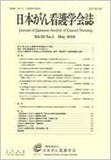Japanese
English
- 販売していません
- Abstract 文献概要
- 参考文献 Reference
- サイト内被引用 Cited by
要旨
本研究の目的は,がん薬物療法に起因する脱毛が発現した成人男性患者の職場復帰時の感情,考え,対処を明らかにし,必要な看護実践について検討することである。
脱毛したまま職場復帰した成人男性患者6名に,半構造化面接を実施し,Krippendorffの内容分析の手法を用いて分析した結果,【自然な姿ではないことの恥ずかしさ】【就業に脱毛は無関係】【脱毛対処行動決定要因は自分と他者との関係性】【自己イメージ回復への切望】【他者への配慮としての脱毛カムフラージュ】の5大表題に類型化された。このうち,【自然な姿ではないことの恥かしさ】および【他者への配慮としての脱毛カムフラージュ】は,先行研究結果とは異なる新しい知見であった。
看護実践として,かつら装着や眉を描くという対処を選択しようと考えている患者には,職場復帰までに物品の準備とコントロール感覚を掴めるような実践トレーニングが必要であること,かつら装着の健康上の意義を強調すること,患者のわずかの再発毛であっても肯定すること,などの支援の必要性が示唆された。
The purposes of this study were to clarify the feelings, thoughts, and coping strategies of adult male patients with cancer chemotherapy drugs-induced alopecia upon their return to work, and review the necessary nursing practices.
We conducted semi-structured interviews with six adult male patients who returned to work without a full recovery from alopecia, and analyzed the responses using Krippendorff's content analysis method. The results indicated that the responses could be categorized into five main themes: “feeling embarrassed at looking abnormal,” “the hair loss is unrelated to employment,” “the hair loss coping method depends on the relationship with oneself and others” “earnest desire to self-image recovery,” and “hair loss camouflage as consideration to others.” “Feeling embarrassed at looking abnormal” and “hair loss camouflage as consideration to others” were new findings from the current study that were different from those previously published.
The results indicated that it may be necessary for nurses to support these patients by performing practical training so that a patient can prepare necessary materials and achieve a sense of control before his return to work, by stressing the health benefits of wearing a wig, and by providing objective comments highlighting the differences between the patient's current and pre-alopecia self-image.
Copyright © 2016, Japanese Society of Cancer Nursing All rights reserved.


